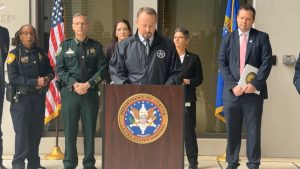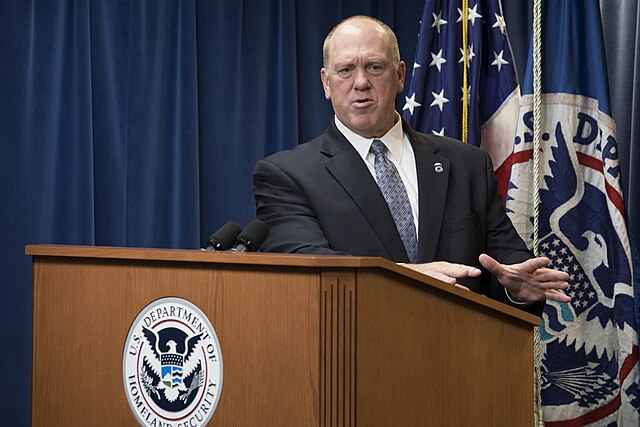In early September 2025, the U.S. Department of Homeland Security (DHS) and U.S. Immigration and Customs Enforcement (ICE) initiated a new immigration enforcement campaign in Massachusetts, formally known as Operation Patriot 2.0. The initiative marks the continuation of a federal strategy targeting immigrants with criminal records who have been released from local custody despite ICE detainers. This latest phase has already sparked significant political and social debate in Massachusetts, particularly in Boston, where sanctuary city policies remain at the forefront of the conversation.
Background: Operation Patriot’s First Phase
Operation Patriot 2.0 follows an earlier enforcement effort that took place in May 2025. During that first sweep, ICE arrested approximately 1,500 individuals across Massachusetts. DHS hailed the operation as a success, emphasizing that those arrested were primarily individuals with serious criminal charges or convictions. Federal officials argued that the enforcement action highlighted a broader problem: local jurisdictions refusing to honor ICE detainer requests, which DHS claims undermines public safety.
A DHS spokesperson explained at the time that sanctuary policies adopted by certain cities, including Boston, had allowed dangerous individuals to remain at large. According to DHS, these local decisions forced federal agencies to step in more aggressively to apprehend individuals who otherwise would have remained in custody pending immigration proceedings.
Focus of Operation Patriot 2.0
The second phase of Operation Patriot, launched in early September, is designed to build on the framework established in May. Federal officials have confirmed that the operation is primarily focused on immigrants released from local custody despite ICE detainers, with an emphasis on those charged or convicted of serious crimes.
According to DHS, the objective is twofold:
- Public Safety: Remove individuals considered a threat to communities due to criminal activity.
- Accountability: Highlight conflicts between federal immigration enforcement and local sanctuary policies.
The DHS statement reiterated that ICE officers are targeting individuals accused or convicted of crimes including sexual assault, homicide, drug trafficking, and gang-related offenses. Federal officials argue that by prioritizing these individuals, the operation directly addresses threats to community safety while simultaneously pressing the case against sanctuary policies.
Sanctuary Policies Under Fire
Boston, under Mayor Michelle Wu’s leadership, has maintained sanctuary city policies that limit cooperation between local law enforcement and federal immigration authorities. These policies generally restrict local agencies from inquiring about immigration status or honoring ICE detainers unless mandated by a judicial warrant.
Federal officials have sharply criticized these measures. In a public statement tied to Operation Patriot 2.0, DHS directly challenged Mayor Wu’s policies, claiming that they prioritize the interests of undocumented immigrants over those of law-abiding citizens. The spokesperson accused sanctuary policies of “harboring criminals” and undermining the effectiveness of federal enforcement.
Mayor Wu, in response, has defended Boston’s approach. She argues that sanctuary policies are not about protecting criminals but about ensuring community trust in law enforcement. According to Wu, when immigrant communities fear deportation for reporting crimes or cooperating with police, public safety suffers. She has framed the federal criticism as a misrepresentation of the city’s priorities, emphasizing that Boston remains committed to protecting all residents and fostering trust-based policing.
Federal-State Tensions on Immigration Enforcement
The rollout of Operation Patriot 2.0 underscores the ongoing clash between federal immigration authorities and state or local governments. Massachusetts, like several other states, has adopted policies designed to limit local cooperation with ICE, citing both humanitarian and legal concerns. These measures often conflict with federal enforcement priorities.
Federal officials argue that such conflicts create gaps in public safety. For instance, when local jails release individuals wanted by ICE without notification, federal agents are forced to conduct arrests in the community, which can be riskier for both officers and residents. Critics of sanctuary policies also claim that they encourage recidivism among offenders who otherwise would have been deported.
Supporters of sanctuary policies counter that immigration enforcement is fundamentally a federal responsibility, and that local police should not be conscripted into that role. They argue that blending local policing with immigration enforcement erodes trust, particularly in immigrant-heavy neighborhoods, making residents less likely to report crimes or serve as witnesses.
This dynamic creates a recurring cycle: federal officials conduct large-scale enforcement operations like Operation Patriot, while local leaders insist such actions undermine community cohesion.
Political Reactions
Operation Patriot 2.0 has triggered strong reactions from political figures and advocacy groups. Immigration advocates in Massachusetts have condemned the operation, warning that it will instill fear in immigrant communities and disrupt families. Community organizations argue that the federal government is using broad enforcement sweeps that go beyond targeting individuals with serious criminal records.
On the other side, federal officials insist the operation is narrowly tailored. DHS statements have emphasized that the focus remains on individuals with prior criminal charges or convictions, not on undocumented immigrants without criminal histories. Supporters of the federal effort argue that sanctuary policies force DHS into such high-profile operations by failing to detain individuals at the local level.
Broader Implications for Immigration Policy
The launch of Operation Patriot 2.0 is not only a Massachusetts issue—it reflects the broader direction of U.S. immigration enforcement under the current administration. Federal authorities have prioritized aggressive immigration enforcement, particularly against individuals with criminal records. The operation also highlights the administration’s ongoing emphasis on challenging sanctuary cities.
The scale and publicity surrounding Operation Patriot 2.0 suggest that similar operations could expand to other states, especially those with significant sanctuary policies. Massachusetts is not alone in limiting local cooperation with ICE; states like California, Illinois, and New York have adopted similar frameworks. If federal officials continue their strategy, those states could see comparable operations in the near future.
Community Impact
Beyond the political and legal battles, the impact of Operation Patriot 2.0 is being felt in communities across Massachusetts. For immigrant families, the operation has heightened anxieties about potential arrests. Advocacy groups report increased calls to hotlines and legal aid centers, as families seek guidance and protection.
Meanwhile, law enforcement agencies in Massachusetts face renewed scrutiny. While Boston officials remain publicly opposed to ICE collaboration, DHS has signaled that local resistance will not prevent federal action. This ongoing tug-of-war between federal and local authorities leaves communities caught between competing priorities.
Conclusion
Operation Patriot 2.0 represents a significant escalation in the federal government’s immigration enforcement strategy in Massachusetts. By focusing on immigrants with criminal records who have been released from local custody despite ICE detainers, DHS and ICE are reinforcing their commitment to prioritizing public safety as they define it. Yet the operation has also reignited long-standing tensions over sanctuary city policies, drawing sharp lines between federal authority and local governance.
As the operation unfolds, Massachusetts finds itself at the center of a national debate. The clash between DHS and sanctuary jurisdictions is unlikely to abate, with both sides standing firm on their positions. For immigrant communities in Massachusetts, the stakes remain deeply personal—balancing fear of federal enforcement with the need for local trust and safety.
At over a thousand arrests in its first phase and a renewed push in its second, Operation Patriot is poised to remain a focal point in the broader U.S. immigration debate. The outcome in Massachusetts may well shape how similar operations are conducted nationwide, making Patriot 2.0 not just a local issue, but a national bellwether for immigration policy in 2025 and beyond.

James Jenkins is a celebrated Pulitzer Prize-winning author whose work has reshaped the way readers think about social justice and human rights in America. Raised in Atlanta, Georgia, James grew up in a community that instilled in him both resilience and a strong sense of responsibility toward others. After studying political science and creative writing at Howard University, he worked as a journalist covering civil rights issues before dedicating himself fully to fiction. His novels are known for their sharp, empathetic portraits of marginalized communities and for weaving personal stories with broader political realities. Jenkins’s breakout novel, Shadows of Freedom, won national acclaim for its unflinching look at systemic inequality, while his more recent works explore themes of identity, resilience, and the fight for dignity in the face of oppression. Beyond his novels, James is an active public speaker, lecturing at universities and participating in nonprofit initiatives that support literacy and community empowerment. He believes that storytelling is a way to preserve history and inspire change. When not writing, James enjoys jazz music, mentoring young writers, and traveling with his family to explore cultures and stories around the world.









